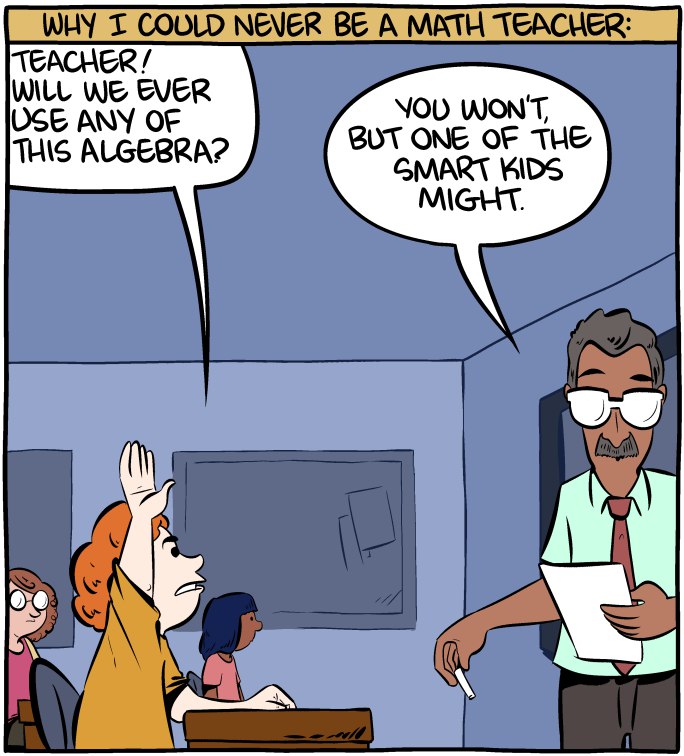Ranter
Join devRant
Do all the things like
++ or -- rants, post your own rants, comment on others' rants and build your customized dev avatar
Sign Up
Pipeless API

From the creators of devRant, Pipeless lets you power real-time personalized recommendations and activity feeds using a simple API
Learn More
Comments
-
-
It exists in the limiting case. Look up L’Hôpital’s rule and apply it to f(x)/g(x) where f(x)=2x and g(x)=x at x=0.
-
 Gophyr18938y@zlice that's not how infinity works. It's not a number. It's not any number. It's a symbolic representation for something you can't otherwise compactly represent.
Gophyr18938y@zlice that's not how infinity works. It's not a number. It's not any number. It's a symbolic representation for something you can't otherwise compactly represent. -
 jeeper56448y@zlice but it’s not really infinity...it’s undefined. If you wanted to divide a cake among your zero friends. It doesn’t make any sense, and your cake is a lie.
jeeper56448y@zlice but it’s not really infinity...it’s undefined. If you wanted to divide a cake among your zero friends. It doesn’t make any sense, and your cake is a lie. -
 stacked26288yNothing prevents you to define a theory where 0/0=2. Certainly, this theory cannot be standard number theory, but as long as your axioms are consistent, everything's fine.
stacked26288yNothing prevents you to define a theory where 0/0=2. Certainly, this theory cannot be standard number theory, but as long as your axioms are consistent, everything's fine.
Example: you can take Peano arithmetic, say that 0 is the unit element and that / behaves like addition. You're done: now 0/0 in your new arithmetic is the same as 1+1 in standard arithmetic.
0, 2 and / are just symbols. Up to you what to do with them (but be consistent!) -
I think you mean to say prove how (100-100)/(100-100) = 2, which some mathematicians have extrapolated but have ultimately concluded it is impossible despite their techniques since they're untraditional.
-
@stacked thank you. The one comment that actually makes sense.
(Though I would avoid the term "unit". For one thing, both +1 and -1 are units in the ring of integers. Unless you meant positive integers only, which is usually the case when dealing with Peano arithmetic, but still, just a clarification). -
@olback this is wrong. You COULD define Single Operations. Also, 0/0 is o grea area, so you usuolly define its result in your papers before using it
-
 cbsa56468y@headgearhair
cbsa56468y@headgearhair
finally, someone who follows maths topics
(100-100)/(100 - 100) = 0/0 = 2
(10^2 - 10^2)/(100 - 100) = 2
(10 - 10) (10 + 10) / 10(10 - 10) = 2
(10 + 10)/10 = 2
20/10 = 2
#but what is the problem with this? -
@cbsa
You cancelled out (10 - 10) from both numerator and denominator. You cant do that man. You just cant. -
@cbsa
(10 - 10) = 0
You are multiplying both numerator and denominator by 0
By that logic I can prove anything. It all boils down to the simple rule, you cannot divide by 0. Some might say it is ∞ but it is not and infinity is just some non representative number. -
@cbsa
Not if that expression evaluates to 0. Even if you are using variables like (a - b) everywhere it is specified that a ≠ b. -
-
 jeeper56448y@bitsnpieces @cbsa
jeeper56448y@bitsnpieces @cbsa
You applied a transformation to the numbers for that you didn’t not apply to the denominator. This throws the whole problem off track. -
@cbsa
Whatever floats your boat man. If you are happy believing I am wrong and you are right, let it be.
I am thinking probably the next thing you will say is earth is flat. Everyone's has their own beliefs. If you feel 0/0 = 2, so be it man. Be happy. Peace out. -
This isn’t an easy topic so let’s keep it friendly.
If you have 12 mins then this guy does a decent job of explaining the problem and the solution (towards the end he mentions L’Hôpital’s rule as per my previous reply, although doesn’t go into any proof of justification): https://youtu.be/oc0M1o8tuPo -
@cbsa, @bitsnpieces is right. "Cancelling" is simply shorthand for multiplying or dividing by the same thing on both sides of that equation. In the division case, you can't use it if there's a possibility of division by zero (yes, possibility). You can only do it when you're certain that zero isn't involved.
Many other such transformations have implicit conditions in them.
Also, evaluating 0/0 is not valid, no matter what (keeping the traditional definition of 0 and /). Evaluating 0/0 as an undefined expression in a limit is possible in some cases, if the limiting value is finite. -
@joycestick No need even for L'hospital because the x cancels. It is a limit, so x!=0, so you can do that.
-
@Mathtauathogen Yeah, sorry, I knew it was a poor example when I posted, but I didn’t want to open a can of worms about differentiability and convergence. You don’t need L’Hôpital in the example, but it does meet the conditions and demonstrates the principal.
Apologies if this just confused the debate. I was just trying to get across that 0/0 can genuinely exist in the limit, and can be anything (using nx/x).
Related Rants


 Math is hard.
Math is hard. When you wanted to know deep learning immediately
When you wanted to know deep learning immediately :)) finally a good answer
:)) finally a good answer
can anyone prove 0/0 = 2
well, in the comments.
rant
prove
math
for engineers